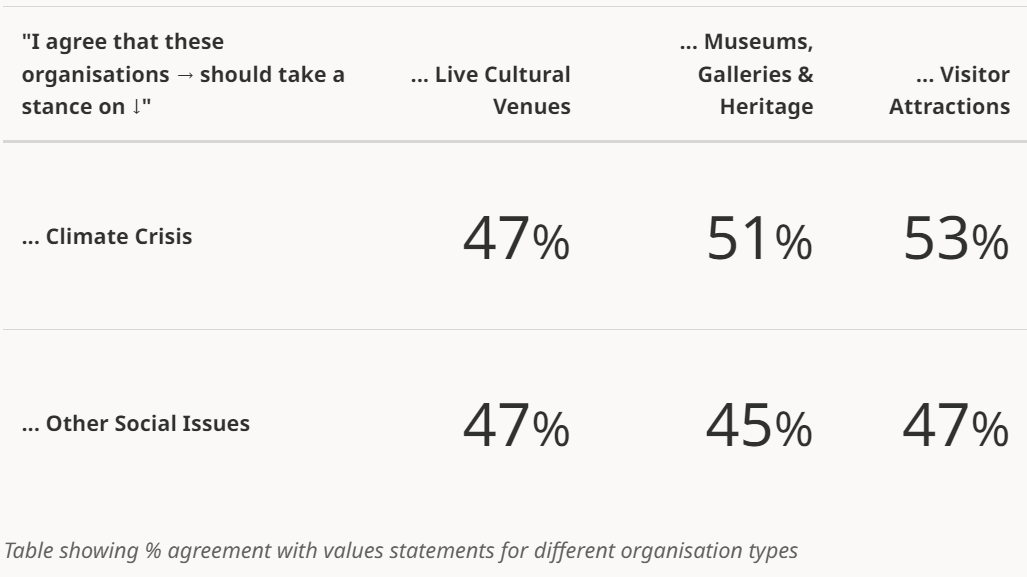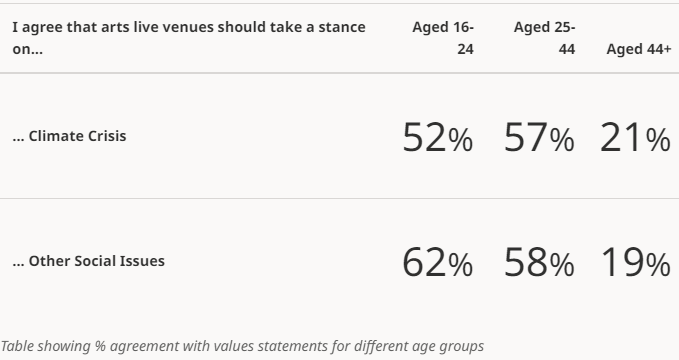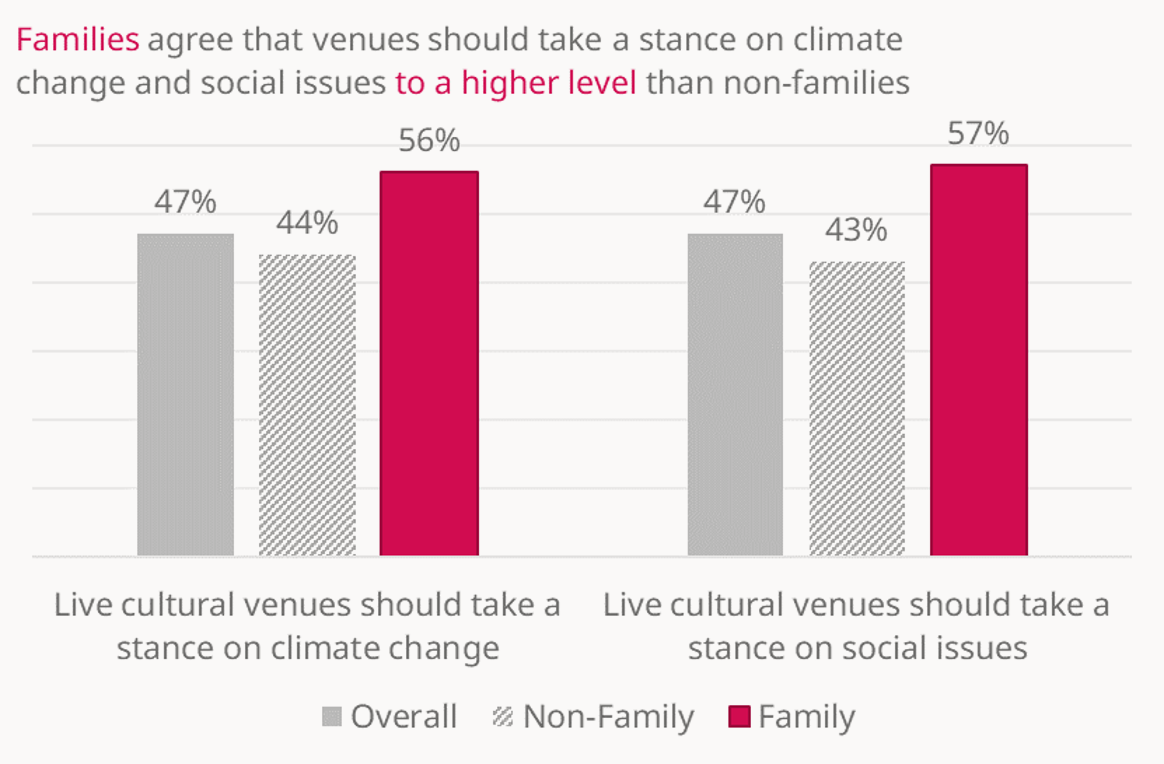Social issues and climate concerns matter to audiences
July 2023
This research is from The Audience Agency's nationwide longitudinal (ongoing) panel survey of changing views about participating in creative and cultural activities through the recent and ongoing crises, and beyond, the Cultural Participation Monitor.
Contents
Themes
People (especially younger ones and better off families) say that they care whether venues share their own social and environmental values - particularly when it comes to the Climate Crisis - and that they are more likely to attend if organisations take an active stance on these issues.
Overall Attitudes
We asked respondents how far they agree with two key statements:
- "I prefer to go to cultural events at venues which I know share my values"
- "Venues should take a stance on climate change and/or social issues"
51% of respondents say that they would generally prefer to go to cultural venues that share their values, while almost half are more actively willing to engage with organisations that take a visible stance on Social Issues - even more so specifically regarding the Climate Crisis.
- Though on the surface 51% seems like a close run thing, in reality far more agreed that whether organisations share their own values is a positive driving attendance factor for them, than those who disagreed:
Breaking that down a little, we see that this holds true across all venue types, again, more so regarding the Climate Crisis, than broader Social Issues:

Younger Audiences
Age appears to have the biggest influence on respondents’ attitudes around climate and/or social issues, with younger (Gen Z and Millenial) people caring far more about these factors than older ones (Gen X and Baby Boomers).
Indeed, over 60% of younger audiences (16-44) state that they prefer to go to cultural events at venues that share their values.
- This breaks down to 65% of 16–24 year-olds agreeing with this statement, and 61% of 25-44 year-olds doing so.
- Moreover, c. 55% of these younger groups feel it is important that those venues actually take a stance on Climate Change, and c. 60% on broader Social Issues.
- Looking more closely at these younger groups, roughly broken down into Generations Z (16-24) vs Millenials (25-44), we see that that Social Issues actually emerge as being fractionally even more important to the younger generation than the Climate Crisis:

Audience Spectrum Segments
The extent to which people care if an organisation expresses a stance on these values is not necessarily commensurate with their general level of cultural engagement. In fact, it polarises at the top and bottom ends of that spectrum.
For example, of all the segments...
- Experience Seekers (Highly Culturally Engaged) rank here 1/10 in most commonly strongly agreeing both that they prefer organisations to share their climate and social values, and to actively express them,
- Followed by Kaleidoscope Creativity (Low Culturally Engaged) ranking here very highly at 3/10 in values-driven concern,
- While the largest population group Dormitory Dependables (Medium Culturally Engaged) ranks here 10/10 with the lowest interest in value alignment of any Audience Spectrum segment.
That said,
- Most Audience Spectrum groups are more likely than not to agree that organisations' climate/social positions matter to them to some extent.
- Although three groups in particular (who collectively account for almost half - 45% - of the UK population) are more inclined than others to disagree that this matters to them at all, these being: Dormitory Dependables, Home & Heritage, and Commuterland Culturebuffs.
Finance and Families
Finances have an influence on whether people prefer to attend venues that share their specific values, with better-off families more likely to take this into consideration:
- Whilst, overall, 43% of respondents strongly agree that they are attracted to venues that express simpatico social and climate statements, this picture changes when we factor in people's financial and familial status.


- Respondents with dependent children are far more likely to be concerned with how venues align with and express their social and climate values, than people who don't have kids at home.
- And generally the better off people are financially, the more inclined they are to take whether or not venues have taken a stance on these issues into account when considering whether or not to attend.
Related videos
TEA Break | Following Arts and Cultural Organisations on Social Media
Watch nowCultural Participation Monitor | Latest Findings on Audience Attitude and Behaviours | Wave 9
Watch nowOther findings from Wave 9 | Jul 2023 | Live/digital, social values. audience behaviour
-
Cost of Living
It’s no surprise that the UK population feel worse off than they did last year (33% feeling worse off, 49% about the same and only 18% better off, a net 15% reduction).
-
Audiences prefer live events to digital
This report uses data from wave 9 of the Cultural Participation Monitor (CPM) to understand the extent audiences engage with live versus digital events, finding that:
- All audiences prefer live events, followed by at home viewing and then watching at a cinema screening.
- Lower engaged segments are more open to viewing at home and at the cinema compared to higher engaged segments.
- Younger people are more open to all viewing platforms and artforms compared to audiences aged 45 and over
-
Audiences prefer live events, but how much varies by artform
Data from the CPM suggests that the more popular an artform is the more open audiences are to viewing it in different formats other than live. This report presents insights into how the popularity of an artform and the initial audience interest can determine how engaging people find non-live events for a particular artform.
